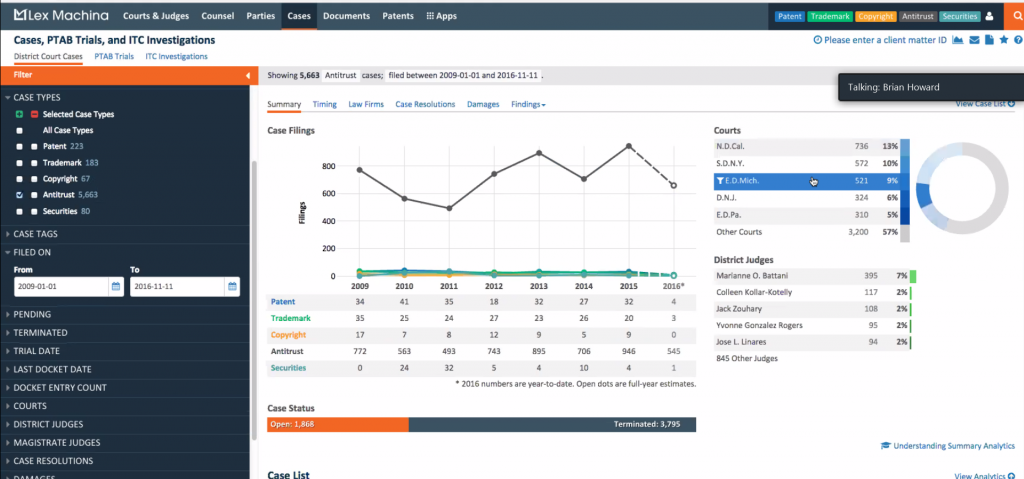
This is a screencap taking during a demo I was given last week by Brian Howard, Lex Machina’s legal data scientist.
The legal analytics company Lex Machina is announcing today its expansion into a third practice area, antitrust law. This follows its expansion in July to add securities law.
Until its acquisition last year by LexisNexis, Lex Machina had focused exclusively on intellectual property. Since the acquisition, it has been using LexisNexis’s collection of federal and state docket data to expand into other practice areas.
Today’s release adds some 7,800 antitrust cases active since 2009, according to Lex Machina, allowing attorneys to uncover trends relating to timing of cases, resolutions, findings, damages and remedies, as well as opposing counsel, law firms, parties, judges, magistrate-judges, venues, and more. Today’s release also includes multidistrict litigation (MDL) cases.
New features with today’s release include:
- Expanded case coverage. Lex Machina now includes cases brought under the Sherman Act, Clayton Act, Robinson-Patman Act and Federal Trade Commission Act.
- New data source and case linking. Existing Lex Machina case data is now integrated with data from the Judicial Panel on Multidistrict Litigation to provide accurate MDL case counts. The platform also links procedurally connected cases to let attorneys analyze them in the right context.
- Antitrust findings analytics. New tags have been added for class actions, DOJ/FTC enforcement cases, Robinson-Patman Act price discrimination cases, and cases where counterclaims were asserted.
- New data on settlements. Until now, Lex Machina has not tracked data on settlements because that data is typically difficult to uncover from the docket. With today’s release, it adds class action settlements, since those must be filed and approved by the court and thus can be extracted for data analysis.
- Enhanced case timing analytics. Median days have been added to dismissal, class certification and summary judgment orders.
Also newly added to Lex Machina is data on U.S. magistrate judges for all covered practice areas. Previously it included only U.S. district judges.
The MDL feature allows users to view data about both the master MDL case and all associated cases. A user can view the master case and navigate from there to any individual case and then easily return to the master case. Users can also see how many of the associated cases have actually had a MDL resolution.
To read more about the company, see my posts tagged Lex Machina.
 Robert Ambrogi Blog
Robert Ambrogi Blog